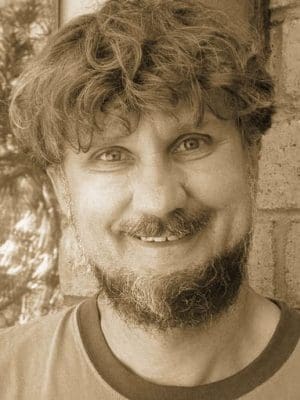Army Major Donald Makay completed four tours of duty in Iraq, serving some 40 months in places such as Baghdad, Mosul, and Sadr City as an infantry commander and security adviser to the Iraqi army and police. He came back, as he says, “with a lot of dust in my uniform and a lot of sweat, too.” But at least he did come back, unlike the more than 4,000 American servicemen and servicewomen who lost their lives there. More than a few of Makay’s comrades were among those felled by bullets and bombs.

Army Major Donald Makay co-founded Iraqi Hope Foundation, which aims to offer young Iraqis a future.
“I just started to ask myself, What needs to happen in the country for [these deaths] not to be in vain?” he says.
The answer led him to enroll in a new certificate program in nonprofit management offered by the Krieger School’s Advanced Academic Programs.
“All over, we saw a lot of young Iraqis who wanted something to build their lives around, an identity, and a way to contribute to society,” Makay says. “And women, of course, were not as empowered as they should be. People just didn’t have jobs—something long term to give them the chance to have a proper family.” Idle youth with little to look forward to, Makay adds, are more easily courted by violent extremist groups. “Sometimes they will take up the sword to prove themselves that way,” he says.
So in 2010, with mostly his own money, Makay and fellow veterans Owen Koch and Jerry Lankford founded the Iraqi Hope Foundation, a charity with a twofold goal: to honor the fallen while offering young Iraqis a future. Through its program called One Sacrifice, One Hope, entrepreneurial Iraqis who want to launch their own businesses are provided startup grants of between $5,000 and $25,000. Each enterprise is then dedicated to a fallen U.S. service member.
As Makay began developing the foundation, he realized that neither his bachelor’s degree in communications from Michigan Tech nor his extensive military training adequately prepared him to run a charitable organization. While serving in Afghanistan last year, he learned from a Johns Hopkins alumnus friend about the school’s new graduate certificate program in nonprofit management, which features a global perspective and aims to sharpen analytical and management skills. Makay actually completed the first two of six online courses in the evenings while still in Afghanistan. “It has brought a whole new level of professionalism to our work,” he says. Of the 26 students currently enrolled in the new program, Makay was the first to earn the certificate last year.
Makay says the Iraq financial sector is still tumultuous, and banks are hesitant to make loans, especially to young people without collateral. Interest rates can also be crushingly high. His foundation has to be prudent in awarding seed money. He has an extensive application process that requires grant seekers to develop business and marketing plans for their proposals. “We are looking for something that’s sustainable,” Makay says.
The first grant recipient was Muthanna Badiya, who received $25,000 to start a construction materials business outside Baghdad. It was dedicated to Army Captain Greg Dalessio, who was killed by small arms fire two years earlier. Badiya used the funds to build a small office and a fenced enclosure for inventory. Today he has 10 employees and an income of $17,000 a year, which is nearly three times the national average.
At present, Iraqi Hope is operated by eight volunteers, including two Iraqis based in Baghdad. Plans call for expanding to include paid full-time staff in the U.S. and Iraq, who will construct a database of business proposals. Fundraising for each proposal will be turned over to the family, friends, and community of the fallen service person to whom it is dedicated. Makay imagines money being raised using both the latest Internet-based crowd-funding techniques and more traditional methods, such as 5K races.
“This is a way for the family to know that at least one Iraqi’s life changed for the better, and not just for a month,” he says. “If they run their business right, they could build it into a great future.”




